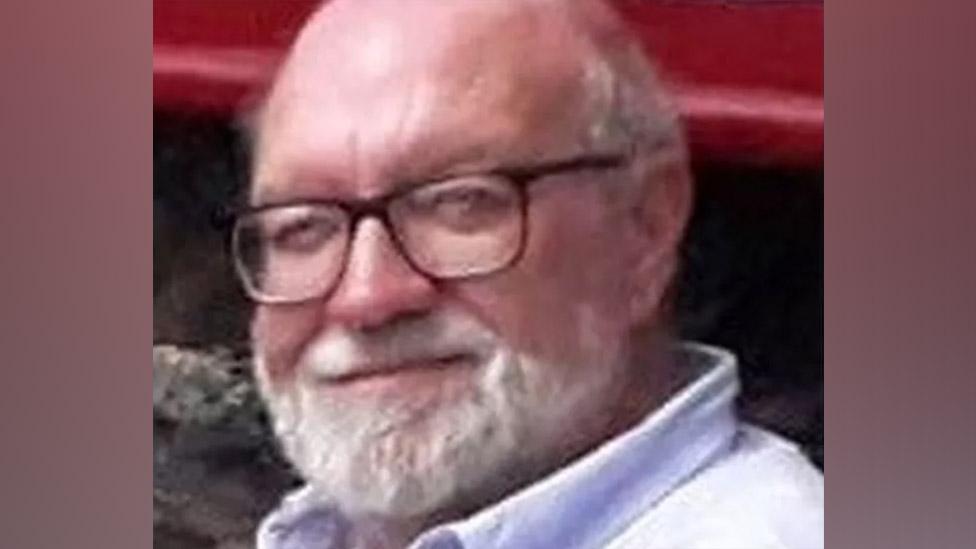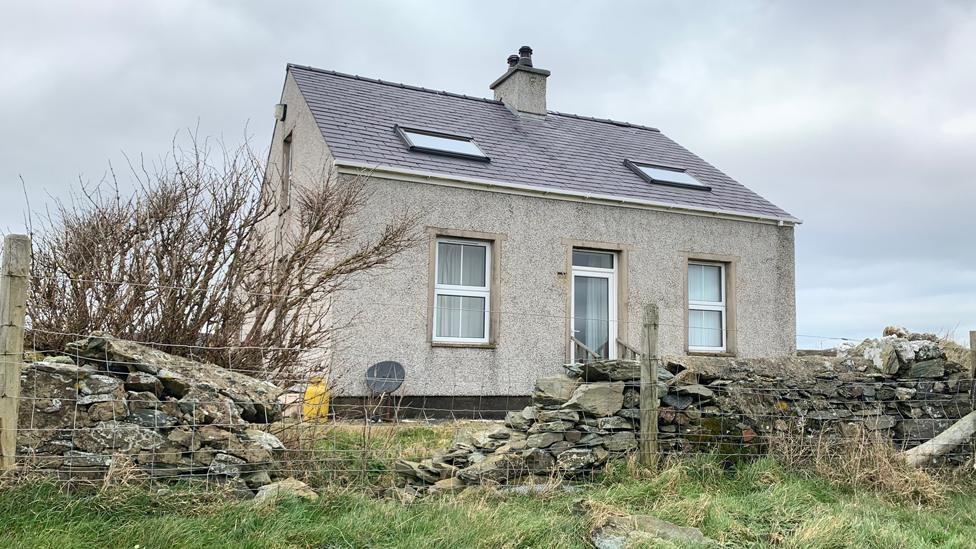Anglesey crossbow murder victim defrauded of £200k, jury told
- Published

Gerald Corrigan and his partner Marie Bailey gave £200k to Richard Wyn Lewis, who they both regarded as a friend, hears court
A "conman" took £200k from a crossbow murder victim who believed he was a friend, a court has heard.
Richard Wyn Lewis, 51, of Llanfair-yn-Neubwll, Anglesey, is accused of defrauding Gerald Corrigan, 74, and partner Marie Bailey.
He claimed the money was for land sales, property development and horses, Mold Crown Court was told.
Mr Lewis denies 11 counts of fraud and one count of intending to pervert the course of justice.
Mr Lewis's partner, Siwan Maclean, 53, of the same address, denies one charge of entering into a money laundering arrangement.
Unrelated to the alleged fraud, Mr Corrigan was killed with a crossbow outside his Anglesey home in 2019.
Opening Lewis's trial on Tuesday, Peter Rouch KC prosecuting, told the jury: "That murder and the reasons for it have nothing whatsoever to do with this case or the issues in it.
"It explains why you won't be hearing from Gerald Corrigan and it explains why police began speaking to Marie Bailey in April 2019.
"It was during those conversations police had with her that matters to which this case relate first came to light."
'He is a fraudster'
The court heard Lewis was accused of conning a number of people out of money between 2015 and 2020.
Mr Rouch said: "Wyn Lewis is a con man. He is a fraudster.
"During the period spanned by this indictment he conned a number of different people out of varying sums of money, sometimes in the hundreds of pounds, sometimes in the thousands, many thousands."
He said Mr Corrigan and Ms Bailey became involved with Lewis in 2015.
Mr Rouch said: "Both came to regard him as a good and trusted friend, not recognising the fraudster that he was."

Mr Lewis told Mr Corrigan and Ms Bailey he would help them with the development and sale of their home, hears jury
The court heard the first false representation made by Lewis to the couple concerned the "apparent potential development and apparent potential sale" of their home.
Mr Rouch said: "I say apparent because there was no such potential development and there was no such potential sale.
"It was a figment, a figment thought up by Wyn Lewis to get his hands on their cash."
He said Mr Lewis persuaded Mr Corrigan he could sell their home to a developer for more than £2m, allowing him to buy somewhere more suitable for Ms Bailey, who had multiple sclerosis.
The court heard Mr Lewis told Mr Corrigan he had a potential buyer and had enlisted the help of a retired planning officer.
'The whole thing was a sham'
He also advised Mr Corrigan to set up an off-shore bank account, which he said £120,000 was needed for, and to buy a piece of nearby land.
Money was paid to Mr Lewis in cash, without receipts or documentation being provided, the jury heard.
Mr Rouch said: "The whole thing was a sham. It was a sham which cost Gerry Corrigan and Marie Bailey many thousands of pounds."
The court heard Ms Bailey transferred £50,000 to the bank account Ms Maclean, Mr Lewis' partner, believing it was for the purchase of an old schoolhouse in Llanddona, Anglesey, which could also be sold to a developer.
But, the jury was told, the building had been sold to the village hall committee four months before.
The couple also transferred money believing it was to buy horses, which Lewis told them were being stabled in Ireland, the court heard.
Ms Bailey also paid Lewis to take her car away after he told her it needed to be scrapped, but he went on to sell it for £5,300, Mr Rouch said.
He told the court work by a financial analyst showed the amount given to Lewis by the couple totalled about £220,000.
Two days before he was shot, Mr Corrigan gave £200 to Lewis, because that was all he could afford, the court heard.
Mr Rouch said: "As he apparently said to Wyn Lewis at the time: 'There is no more money."'
The trial is expected to last four weeks.